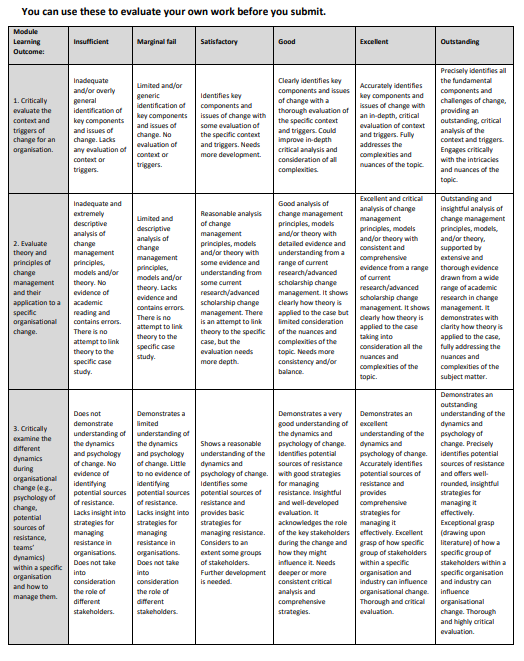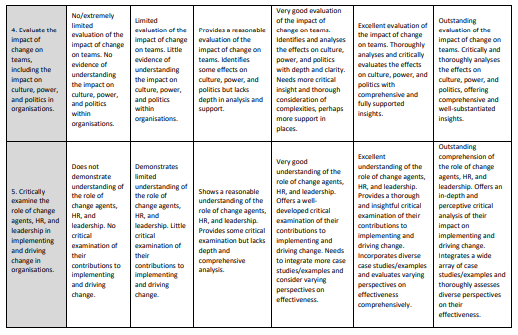- CIPD level 5HR02 Assignment: Talent Management and Workforce Planning Unit Guide
- Level 3 D/615/3823 Assignment: Regulation, Protection, and Collaborative Practice in Health and Social Care
- ILM Level 4 Assignment 01: Developing Leadership Styles: An Action Plan for Effective Leadership and Team Engagement
- Level 6 Unit T/615/2726 Assignment: Strategic Project Management: Identifying, Planning, and Controlling Projects for Business Success
- EDD-U1-T4 Assignment: Internal and External Support Services for Educational Practitioners
- Discussion Paper on Market Forces and Government Interventions for Business Leaders
- Unit 10 Customer Relationship Management Assignment – CRM Processes & Stakeholder Roles
- CIPD 7HR02 Resourcing and Talent Management to Sustain Success
- Athe Level 3 Health and Social Care Assessment Questions
- M/618/4168 Unit 2 Principles, Values and Regulation in the Health and Social Care Sector – ATHE Level 3
- ILM Communication Skills Self-Assessment
- ILM Unit 8600-309: Understand How to Establish an Effective Team
- CMI Unit 525 Using Reflective Practice to Inform Personal and Professional Development
- Understand and Work with a Wide Range of Stakeholders and Organisational Structures – Assignment 1
- Assessment: Financial Performance Evaluation of Savory Snacks Company Ltd for Credit
- CMI L5 Assignment: Managing Stakeholder Relationships: Strategies, Challenges, and Best Practices
- Level 3 Unit 2 Assignment: Principles, Values and Regulation in the Health and Social Care Sector
- COM4006 Assignment: Introduction to Academic Skills and Professional Development
- UNIT CMI 706 Assignment: Finance for Strategic Leaders: The Role, Scope, and Impact of Finance
- ENGINEERING DESIGN TMA2 v1: CAD Design Report: Specification, Evaluation & Drawings
Assessment: Managing Organisational Change: Evaluating Strategies, Challenges, and Impact
| University | University of the West of England (UWE) |
| Subject | Evaluating Change |
Assessment Brief
Module learning outcomes assessed by this task:
1. Critically evaluate the context and triggers of change for an organisation.
2. Evaluate the principles of change management, key models of planned change and their application to
various change scenarios.
3. Critically examine the dynamics and psychology of change, the potential sources of resistance and how
to manage resistance in organisations.
4. Evaluate the impact of change on teams, including the impact on culture, power, and politics in
organisations.
5. Critically examine the role of change agents, HR, and leadership in implementing and driving change in
organisations.
Use of AI in assessment: AI can ONLY be used for checking your writing (spelling, grammar etc). You are
NOT to use AI for research, and it is an academic offence to download material from the web and submit it
as your own work or submit work created by using AI tools without appropriate acknowledgement.
Guidance on Referencing (inc AI):
Please note that the aim of referencing is to demonstrate you have read and understood a range of
sources to evidence your key points. You need to list the references consistently and in such a way as to
ensure the reader can follow up on the sources for themselves. You must reference materials used within
your report following UWE Harvard Referencing.
Referencing – Study skills | UWE Bristol Using generative AI at UWE Bristol – Study skills | UWE Bristol
Do You Need Assignment of This Question
Completing your assessment
What am I required to do on this assessment?
The assessment will consist of an individual 3,000-word academic report, applying the theories and
concepts covered across the module to evaluate an existing change initiative. Students are required to
pick one out of four available case studies OR a case study of their own choice (if a student is currently
working for an organisation that is going through a change initiative and they have sufficient information
about how the organisation is approaching and managing the change, a student can choose to focus on
that as their case study) to analyse for this report. Please see the assessment folder on the Change
Blackboard page.
The purpose of this report is to analyse your chosen case study, evaluating how the case study organisation
managed their change initiative and offering practical and relevant recommendations.
Introduction: Tell us about the change initiative – what is changing, why is it changing, what were the triggers for
this change, within what context is this change taking place (organisation). Critically evaluate the context and
triggers of change for the organisation.
Evaluation: Evaluate relevant theories and principles of change management to this specific organisational change.
Critically discuss what is working well and what is not working well? Critically examine the different dynamics during
this organisational change (e.g., psychology of change, potential sources of resistance, teams’ dynamics etc).
Consider the impact of how this change has been managed on teams (this could include the impact on culture,
power and/or politics of the organisation). Do not try to discuss everything you have found within the case study,
pick a few areas, and discuss these in depth.
Recommendations: Based on your evaluation, above, what recommendations do you propose that could improve
the implementation or management of this change initiative? As part of your recommendations, critically examine
the role of change agents, HR, and leadership in implementing and driving these recommendations. Consider the
impact of your recommendations on teams (this could include the impact on culture, power and/or politics in the
organisation). Theoretical and practitioner support is expected here too.
Conclusion: Summarising your report.
References: Aim for at least 30 academic references to support your points throughout and develop your critical
discussion.
Please, use headings and subheadings as required.
Where should I start?
Start by reading the four different case study details (see assessment folder on Blackboard).
Pick which ONE case study you would like to analyse for the purpose of this report. Either one of the four
we have provided or your own case study. If choosing your own case study, please check with the module
tutor that it is suitable to use for this assessment.
Please make sure you are working through each study unit, reflecting on how the content can aid your
assessment. Consider your assessment whislt you work through each study unit, building on your ideas
each week.
A great book to start reading would be Cameron, E. and Green, M. (2015) Making Sense of Change
Management: A Complete Guide to the Models, Tools and Techniques of Organizational Change. London:
Kogan Page, Limited.
What do I need to do to pass?
Refer to the marking criteria, below. The minimum pass mark is 50% for level 7.
How do I achieve high marks in this assessment?
Please refer to the marking criteria and the characteristics of work that achieves a distinction. In summary,
the report should focus on a detailed theoretical discussion explaining and evaluating your chosen change
initiative.
The following criteria will be used in evaluating this assessment:
• Identification of key issues
• Demonstration of an in-depth understanding of the literature
• Evidence of analysis and critical evaluation
• Linking of theory with practice
• Structure that is coherently organized and presents the argument in a logical way with sufficient
use of linking and summaries
How does the learning and teaching relate to the assessment?
All study units could be relevant to your assessment. All study units will include online discussion related to
the assessment, with opportunities to ask questions and there will be additional assessment support in
Study Unit 4.
Please start thinking about your report soon after the module has started and develop your report
alongside the weekly study units. This will help you receive the best support and participate effectively
during assessment related activities.
What additional resources may help me complete this assessment?
• Please make use of UWE library online and the suggested reading list for the module.
• Formative feedback can be provided by your peers and module tutor, please ensure you engage
with your module throughout.
• The Learning Hub and UWE Library offer additional online workshops and workbooks ideal for
developing your academic skills. Details can be found on your programme page.
What do I do if I am concerned about completing this assessment?
How do I avoid an Assessment Offence on this module? 2
Use the support above if you feel unable to submit your own work for this module.
Using Essay Mills or copying other student work (past or present) are examples of previous assessment
offences and will be picked up during the marking process. This is an individual assessment that must be
your own work.
Of course, working with your peers and seeking support from others is recommended, however, your work
must be your own and any points raised that were found elsewhere must be cited, as per UWE Harvard
referencing.


1. In line with UWE Bristol’s Assessment Content Limit Policy (formerly the Word Count Policy), word
count includes all text, including (but not limited to): the main body of text (including headings), all
citations (both in and out of brackets), text boxes, tables and graphs, figures and diagrams, quotes,
lists.
2. UWE Bristol’s UWE’s Assessment Offences Policy requires that you submit work that is entirely your
own and reflects your own learning, so it is important to:
• Ensure you reference all sources used, using the UWE Harvard and the guidance available
on UWE’s Study Skills referencing pages.
• Avoid copying and pasting any work into this assessment, including your own previous
assessments, work from other students or internet sources
• Develop your own style, arguments and wording, so avoid copying sources and changing
individual words but keeping, essentially, the same sentences and/or structures from other
sources
• Never give your work to others who may copy it
• This is an individual assessment, develop your own work and preparation, and do not allow
anyone to make amends on your work (including proof-readers, who may highlight issues
but not edit the work) and When submitting your work, you will be required to confirm that the work is your own, and textmatching software and other methods are routinely used to check submissions against other submissions to the university and internet sources. Details of what constitutes plagiarism and how to avoid it can be found on UWE’s Study Skills pages about avoiding plagiarism.
Buy Answer of This Assessment & Raise Your Grades



